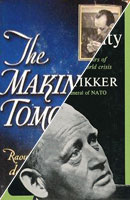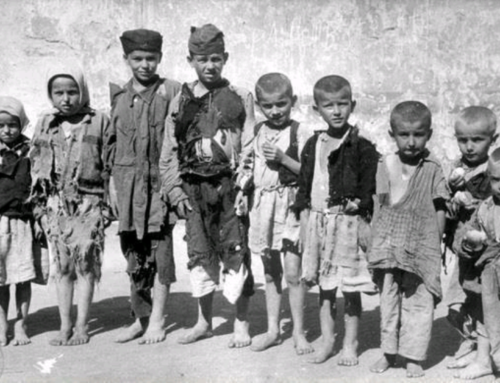
The Making of Tomorrow
by Raoul de Roussy de Sales
Men of Responsibility
by Dirk U. Stikker
One of the truths of sociology and business is that we tend to think that what happens today will happen tomorrow and that what we see today somehow happened yesterday and the day before stretching back infinitely. But we know that isn’t true for most things we see. Such is international relations. The world we live in today was purposely and deliberately shaped by men of vision during World War II and in its aftermath. We know that through history lessons and vague talk about the Marshall Plan, but who really knows the details of how certain key decisions came about and the deliberations behind them?
That question didn’t occur much to me since I left teaching until I ran across two real gems in a used book store recently. I wasn’t looking for books in particular, but the audacity of the names drew me to look into the dust covers and sold me on the books themselves. After reading the books, marking up the pages with notes and tagging pages for reference, I was able to go from the question of “who really knows how these decisions were made” to “what can we take away from the lessons these men left us with for our world today?”
Roul de Roussy de Sales was a French journalist and correspondent who wrote The Making of Tomorrow during the first part of World War II prior to his death during the war. The outcome was far from certain at the time and de Sales was writing about events both as they were happening in the moment and as he thought they ought to in the normative after the war. de Sales’ genius was in applying what he observed and knew about the differences between Europe and the US during an ongoing and fluid wartime situation and projecting it to a post-war world. He foresaw collectivism as the way ahead after the war, although he called it necessary rather than one of several options. He was keenly aware of the US’s business culture and the tendencies of business to want to tamp down political fervor for war where money could be made by kicking the can down the road. But it was in his exploration of liberty within collectivism (both socialist within a state and at the international level like the EU) that he scores highest marks. He put forth the issue in 1942 that grates Europe today: “The dilemma is whether a collectivist society – that is one founded on our real possibilities of production – can be established without destroying the essential principals upon which democracy rests.”
One final caution that de Sales’ work brings to mind is that it is easy to get so caught up in the present that we lose context. While it is true that governments faced existential threats in WWII, humanity did not. de Sales wrote of events as though Europe had not gone through the Thirty Years War, or Napoleon’s conquests or the Middle Ages. The questions he asked about German people and their willingness under Hitler, he could have asked about the French under Napoleon, or the Arabs under Mohammed, or Greeks under Alexander. He summarizes nicely by reminding us that Hitlerian expansion cannot be stopped except by force. Whether such force comes from an outside power or under its own weight, he doesn’t say.
Like de Sales, Dirk Stikker was someone I had not heard of prior to reading his book, Men of Responsibility, which unlike de Sales, was a memoir written after the events in which he directly participated. From running Heineken during WWII, to becoming Holland’s foreign minister, to being Ambassador to the UK, to being Secretary General of NATO, Stikker personally participated in the deliberations and decisions which shaped the modern Western world after the war. His is a lesson in differing principles between states with differing interests, limits of states with limited power and hubris of states with strong power. While Stikker didn’t dwell on the issue, personal relationships between individuals is clearly important in international relations and cannot be overlooked by those who don’t care to take the time to develop them.
In my opinion, Stikker’s gift in this book is a six paragraph summary of international relations that beats any whole book on diplomacy I’ve ever read. He tells us truths from ages ago, today and tomorrow: “However great a nation, it never has all the pieces on the checkerboard – and the checkerboard is vast and the game without end. Some problems in the relations between states are, in their prevailing circumstances, insoluble; others can be solved only gradually, over spans of time which may exceed a man’s lifetime and frequently exceed one’s tenure in office. Some may be solved quickly, a few are solved definitively, and none are solved instantly. In these circumstances it is obligatory to choose carefully those areas of greatest urgency in which there are possibilities for progress, and to recognize those problems in which one can, even with the maximum effort, only build for the future and for other hands.”
de Sales argued strongly for collectivism between states to defeat Germany and to unite after the war. Stikker, having lived through and shaped that time, brings caution into de Sales’ enthusiasm for collectivism. Stikker has harsh words for the UN on standards of conduct which we laugh at today when human rights abusers use their seats on UN committees to grill countries like Sweden and Holland. Interests differ from state to state. That is the reality of the checkerboard. The game is vast and without end. If you’re in the library and looking for a good read, I’d recommend both books.






Leave A Comment